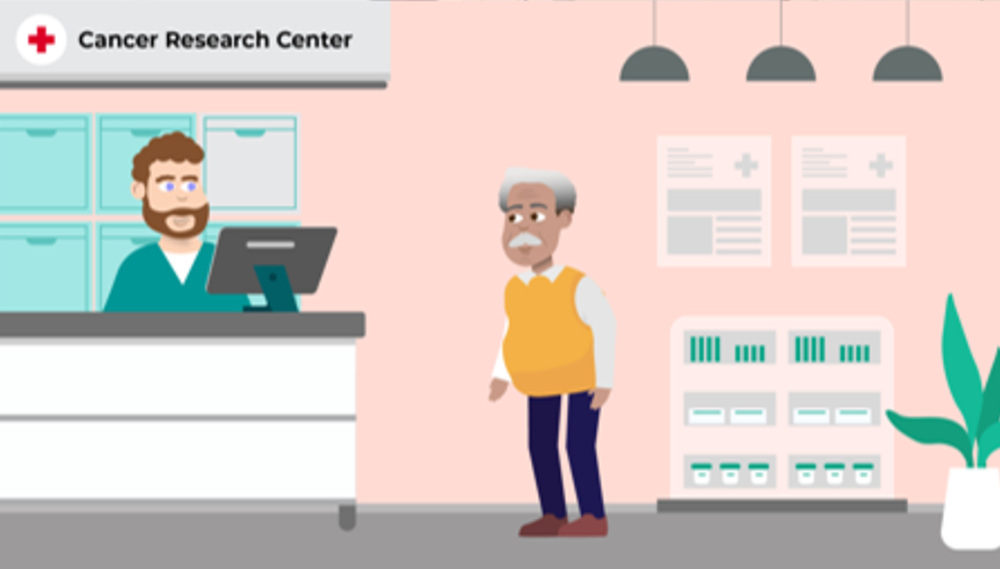
For Patients
Connecting Patients With Clinical Trials for RAS Mutant Cancers
At Revolution Medicines we are committed to the discovery, development, and delivery of targeted therapies for patients with RAS mutant cancer.
Our RAS(ON) Inhibitor Clinical Trial Program is evaluating molecules aimed at targeting a broad range of RAS mutant cancers.
What is RAS?
- RAS is a common oncogene, or a gene that has been shown to cause cancer when mutated (or changed), leading to an estimated 3.4 million cases of cancer globally each year. RAS mutations are most common in pancreatic, colorectal, and lung cancers.
- The RAS gene produces a protein called RAS. The RAS protein controls the growth of cells by switching between the ON [RAS(ON)] and OFF [RAS(OFF)] state. Think of the RAS protein as a switch that can be turned on or off, just like a light switch in a house.
- In cells that are not cancerous, RAS is usually in the OFF position; it only switches to the ON position in response to specific signals from the body. Mutations or changes in the RAS gene can cause the RAS protein to become abnormally active, or frequently in the ON position. This can lead to cell growth that is out of control and, in some cases, causes cancer. A RAS mutant tumor relies on continued communication from the RAS(ON) protein for growth.
- Cancer-causing mutations have been shown to form most frequently in the KRAS, HRAS, and NRAS forms of the RAS gene.
Clinical Trial Program
Revolution Medicines’ RAS(ON) Inhibitor Clinical Trial Program evaluates molecules aimed at targeting a broad range of RAS mutant cancers, including pancreatic ductal adenocarcinoma (also known as PDAC), non-small cell lung cancer (also known as NSCLC), and colorectal cancer (also known as CRC).
An introduction to clinical trials
What is a clinical trial?
A clinical trial is a study that investigates how effectively and safely a new treatment is at treating diseases affecting humans. Clinical trials are done in phases, or steps. Each phase has different goals and involves a different number of participants. In each phase, researchers watch carefully to learn if the new treatment works and how any side effects impact the patient.
Clinical trials are carefully designed and must be approved by an institutional review board (shortened to IRB) to protect the safety and well-being of all participants.

Who are clinical trials for?
Clinical trials are for patients who volunteer to take part in medical research. Patients may consider enrolling in a clinical trial for different reasons. For example, some want to help researchers find a treatment for a disease that is important to them. There are strict requirements to participate in clinical trials. These criteria, called inclusion and exclusion criteria, help identify patients who are the best possible fit for the clinical trial. Patients interested in a clinical trial may talk to their physician to help identify trials that may be appropriate for their condition.

Why should a patient enroll in a clinical trial?
By volunteering to participate in a clinical trial, patients may receive treatment for their disease while helping advance scientific research for future patients.

What does participation in a clinical trial involve?
Clinical trials are conducted in steps. In the first step, the interested patient will go through a screening process to determine if they are eligible for the trial. If the patient qualifies for and consents to take part in the trial, the person managing the trial will assign the patient to a treatment. Once they receive their treatment, this could be either the treatment being investigated or the control treatment, the patient will go through follow-up examinations to determine the impact of the treatment on the patient and their disease. Once the patient has been treated for a certain period of time, their time in the trial will end. However, that does not mean they will no longer have access to a treatment that may be working for them. If applicable, the patient may continue receiving the medication.

Where does a clinical trial take place?
Clinical trials take place in a variety of settings, such as hospitals, clinics, over the phone or the internet, and research centers all around the world. These can include major hospitals, community clinics, doctors’ offices, and universities. The trials are usually conducted by academic researchers at medical centers, pharmaceutical or biotechnology companies, or nonprofit organizations.

How does a patient enroll in a clinical trial?
There are different ways for a patient to enroll in a clinical trial. A patient’s doctor may recommend a trial to them as a potential treatment option. Alternatively, a patient or their doctor may reach out to a clinical trial coordinator to determine if they qualify for a specific trial. To find information on trials that might be appropriate, patients and their doctors can look on ClinicalTrials.gov or patient advocacy webpages.

No matter the stage of their journey, patients should always consult with the doctor who is treating their cancer as they navigate treatment options, including clinical trials.
The clinical trial process
With new investigational treatments being researched, patients may be interested in participating in a clinical trial but may not know where to start. Watch the video below to learn more about the patient journey through a clinical trial, from interest to eligibility and treatment.
FAQ
Patients may have questions about Revolution Medicines’ clinical trial program or the overall clinical trial process. Check out our FAQ section, which follows:
There are 4 phases of clinical trials, each designed to determine how well an investigational treatment works and how safe it is before the treatment can be available to the public.
- Phase 1: a new drug is investigated in a small group of patients (20-80) to determine the safety, adverse effects, and best dose of the medication to be used in future trials.
- Phase 2: if the investigational drug is determined to be safe, treatment is expanded to a larger group of patients (100-300) to look for any additional safety concerns and start the initial investigation into efficacy, or if the drug works well to treat patients with a certain disease.
- Phase 3: the investigational drug is used to treat an even larger number of patients (100s-1000s) to further look at the safety and efficacy of the drug. In Phase 3 trials, the investigational drug is generally compared with placebo or existing treatments known as standard of care. It is generally after this phase when a governing group, such as the FDA, will decide if the drug should be available to the public.
- Phase 4: after the treatment is approved, it is monitored in an even wider population over an extended period of time to understand its long-term effects and safety.
Glossary
Gene
A base unit of heredity that is passed down from parents to their children. Genes are made of sequences of deoxyribonucleic acid (shortened to DNA) found within all cells of the body. They contain information that leads to the production of proteins responsible for everything from eye color to metabolic functioning.
Mutation
Any change in the DNA sequence within a cell. Mutations may be caused by errors during cell division or by environmental exposure to DNA-damaging agents like radiation. Some mutations occur in egg or sperm cells, meaning they can be passed down from parents. While many mutations are harmless, some can affect how cells grow and function. Certain mutations can turn normal genes into oncogenes, which may lead to cancer.
Oncogene
A mutated form of a type of gene called a proto-oncogene, which is involved in normal cell growth and division. When a proto-oncogene is mutated such that multiple copies are made or it becomes overly active, it is called an oncogene. Oncogenes have been shown to cause normal cells to become cancerous.
Pancreatic ductal adenocarcinoma (also known as PDAC)
Pancreatic cancer occurs when abnormal cells within the pancreas grow and divide out of control and form a tumor. PDAC is the most common form of pancreatic cancer.
Non-small cell lung cancer (also known as NSCLC)
Lung cancer is a disease in which abnormal cells grow out of control in the lungs, forming a tumor. NSCLC is the most common form of lung cancer and is classified by the types of cells it affects as adenocarcinoma, squamous cell carcinoma, and large cell carcinoma.
Colorectal cancer (also known as CRC)
Colorectal cancer is a type of cancer that starts in the colon or rectum, which are part of the large intestine. Most CRCs start out as a polyp, or growth, within the inner lining of the colon or rectum. While most polyps are benign, or noncancerous, some polyps can eventually turn cancerous.
National Cancer Institute (shortened to NCI)
The NCI is a part of the National Institutes of Health (shortened to NIH). It is the subdivision dedicated to dispensing cancer-related information to patients as well as providing support and funding for cancer research.
Biomarker
A biomarker is a biological marker that helps doctors locate or watch a condition. Biomarkers can be found in blood, other bodily fluids, tissue samples (such as a tumor), or a body function such as pulse rate or body temperature that indicates an abnormal process, condition, or disease. For some cancers, the presence of a gene mutation, such as a mutated RAS gene, may be used as a biomarker to help guide treatment decisions.
Food and Drug Administration (shortened to FDA)
A United States government body responsible for protecting the public’s health by reviewing and approving any product that can be used on humans or animals, such as drugs, food, and medical devices. The FDA is also responsible for sharing accurate medical and scientific information with the public.
Institutional review board (shortened to IRB)
A group of experts assigned to review and monitor biomedical research involving human volunteers. They are responsible for preserving the rights and safety of all patients volunteering in biomedical research.
Adverse drug effect
A potentially harmful effect resulting from an intervention related to the use of a treatment, which constitutes a hazard and may or may not be associated with a clinically appreciable adverse reaction and/or an abnormal laboratory test or clinical investigation, as a marker of an adverse reaction.
Adverse drug reaction
An appreciably harmful or unpleasant reaction, resulting from an intervention related to the use of a drug or product, usually predicting hazard from future administration and warranting prevention, or specific treatment, or alteration of the dosage regimen, or withdrawal of the product.
Efficacy
How well a therapy works at treating an illness. Also known as the ability of a treatment to produce a beneficial effect on the patient.
Clinical trial coordinator (shortened to CTC)
A person who can answer questions from patients and their doctors. They also will decide whether you may be eligible to join the trial.
The Health Insurance Portability and Accountability Act (shortened to HIPAA)
An act enacted in 1996 that establishes federal standards to protect personal and sensitive health information from being disclosed without the patient’s consent.
Standard of care (shortened to SOC)
A type of treatment that is widely accepted and used by medical experts and health care professionals as a proper treatment for a certain type of disease.
